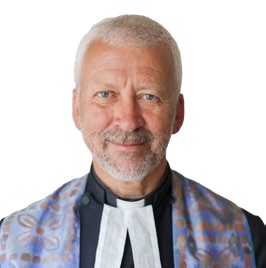‘A place for all’
The Rev Dr Richard Frazer reflects on the roots of the Church in looking forward to the future.

The Rev Dr Richard Frazer
AS I strode through Northern Spain, en route for Santiago de Compostela, I fell into conversation with a woman called Marnie from Australia.
As happens on these long pilgrimages, you end up having Illuminating encounters. At one point, I used the phrase ‘crisis of faith in the west’. She stopped me in my tracks. “Richard,” she said, “there is no crisis of faith in the west, only a crisis of faith in the institutions of religion.”
Nearly 30 years ago, whilst I was a minister in Aberdeen, I attended a series of events run by Professor Will Storrar who taught in Christ’s College at the time. His theme was a reflection on the ‘post-modern’ condition of contemporary Scotland. With sociologists, theologians and other thinkers, he mapped out a diagnosis that explained why our churches were in decline. The analysis had to do not with the failings of the church, but the seismic changes that had taken place in our society.
We were rapidly becoming a pluralist, multi-cultural nation. People could make far more choices about how to spend their lives. Whilst, at one time the church was the focus of so much social as well as religious life, people had more options than ever before. It was not just the churches that people did not join any more – every modern institution was feeling the pinch, a lack of new members.
As I listened to these thoughts, I realised that we had to stop beating ourselves up. It was not so much that the church was failing, it was society that was changing and the models of church we were living with, whilst they nourished some, no longer spoke to huge numbers of people, who were, nonetheless, people of faith and spiritual hunger.
As I have sought to find new and complementary activities for the church in addition to the noble habits of worship and belonging, I have realised something else. That this new way of doing things is actually a recovery of the old way of doing things.
Prior to the Disruption of 1843, the Old Kirk saw itself as a community resource for all, not a membership organisation. When I arrived in my first parish at Collace in Perthshire in the 1980s, someone showed me the Kirk Session minute book. I read about a widow in the 1600s, her home destroyed by fire. She was destitute and homeless and had no means of sustaining herself. The Kirk Session at Collace found a way of rebuilding her home.
I have come to feel that the Free Church that emerged after the disruption, influenced by a modernist, bureaucratic approach, turned the Church into a membership organisation. We still count our numbers year on year as we produce these grim figures, our ‘Statistical Returns’ that we use to make ourselves more miserable about decline and our supposed failures.
“
Whilst, at one time the church was the focus of so much social as well as religious life, people had more options than ever before.
Surely, our places belong to everyone. People can be stakeholders in a church even if their names do not appear on a list. I cannot help but feel that if we recovered the idea of the church as a community resource for all, things might look up.
The spiritual wellbeing of Scotland does not depend on us trying to breathe life back into a modernist institution that has so many echoes in its habits and ways that hark back a century and a half. Maybe we have to look back even further to the Kirk as it was before 1843, a place for all, a resource for firing the Spiritual imagination by seeking to embody the values of Christ’s realm by living justly, loving mercy and walking humbly.
The Rev Dr Richard Frazer is minister at Edinburgh: Greyfriars.